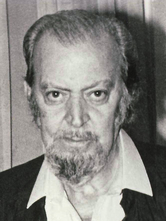
Tasos Leivaditis
1922–1988
Tasos Leivaditis circa 1983.
Tasos Leivaditis is not a poet often discussed in the English-speaking world, but he is one of the greats amongst the postwar generation of Greek writers. Much of his work is not exactly poetry, but short sayings in poetic form that often run to no more than two or three lines.
His literary output is usually divided into three periods. In his first period (1946–56), Leivaditis develops a ‘poetry of the battlefield’ informed by his commitment to the Leftist struggle during WWII and after. In the tradition of social realism, he evokes the horrors of war but also retains an optimism regarding the future. He paid a high price for these ideals: along with many other leftist writers and intellectuals (including Yannis Ritsos), he was exiled to various camps in Greece, though he continued to write poetry.
In 1946 he married Maria Stoupas, a childhood friend who always stood by him in his difficult years of exile. They had one daughter.
In 1952 he published his first book of poetry, Battle at the Edge of the Night. It consists of one long account of the anguish experienced by a soldier plunged in the depths of a night battle.
In his second period (1957–66), after the defeat of the Left in the civil war, existentialist concerns begin to surface and his work takes on a bleaker, more introspective and even more religious tone. This religious element becomes most intense during his third period (1972–87), where much of his work is concerned with the question of God and has an almost prayerful and hymn-like quality. Perhaps the best example is his masterly collection, The Blind Man with the Lamp (1983), which includes a ‘Credo’ that has a similar form to the traditional Christian Credo, but is now suffused with highly expressive and surrealistic imagery. The same collection also includes twelve ‘Conversations’, which are actually heartfelt pleadings from the poet addressed to Christ, such as the following:
Lord, we both live in the dark, the one cannot see the other. But stretch out your hand, and I will find it. Let me talk to you, and you will hear me. Only give to my words something of that great ineffability which reduces you to silence.
Leivaditis had an extraordinary ability to capture the depth of things, small and great. In ‘Lighted Window’, for example, he talks of ‘silent moments in which all words weep’, and writes that ‘alone a lighted window at night renders the world more profound’. And in ‘Aesthetics’, he writes: ‘As to that story there are numerous versions. / The best one though is always the one where you cry.’